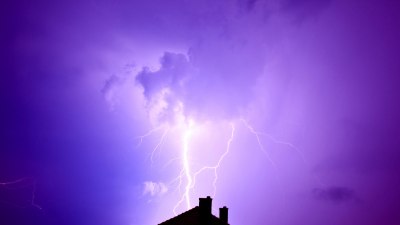Why Weather Is the Perfect Scapegoat for Literally Everything
Discover how weather is often blamed for various issues, from mood swings to traffic delays.

In our daily lives, it's common to hear people attributing their misfortunes or inconveniences to the weather. Whether it's a rainy day ruining plans or summer heat affecting our mood, the weather seems to serve as an easy scapegoat for a myriad of issues. This phenomenon raises the question: why do we often blame the weather, sometimes irrationally, for our problems? This article delves into the reasons behind this tendency and explores the psychological and social implications of using weather as a scapegoat.
The Psychological Aspect of Blame
Human beings have a natural tendency to seek explanations for unexplainable events or feelings. Blaming the weather provides an accessible and tangible reason for our frustration or discomfort. When things go wrong—be it a bad day at work, a canceled plan, or a lack of motivation—pointing fingers at weather conditions is a simplistic way to rationalize our experiences. This is particularly relevant during extreme weather conditions, such as storms or heatwaves, when they can affect our emotional state and productivity. Psychologists have long noted that external events often provide an opportunity to deflect accountability for our internal states, and the capriciousness of the weather makes it a convenient target.
Social Dynamics and Collective Blame
Blaming the weather is a social practice that often occurs collectively. When a group of people experiences a negative outcome, banding together to attribute it to weather conditions provides them a sense of community and shared experience. For example, a group of friends whose outdoor picnic gets rained out is likely to blame the rain together, reinforcing their bond in the shared misfortune. This collective blame can create a narrative that is easier to reconcile against individual frustration and discomfort, reducing feelings of isolation. Social media has amplified this dynamic; people readily share weather-related grievances, leading to a collective acknowledgment of how external conditions have impacted their lives.
Weather and Its Role in Mood Fluctuations
The correlation between weather and mood is well-documented. Studies have shown that weather patterns, such as seasonal affective disorder (SAD), can significantly impact individuals’ psychological health. Lack of sunlight during winter months often leads to feelings of sadness and lethargy, whereas sunny days can uplift spirits and encourage outdoor activity. Consequently, when someone feels down, it is only natural to point to gloomy weather as the culprit, justifying their mood with a tangible cause. Furthermore, anecdotal evidence supports this notion—individuals frequently report feeling less motivated or more stressed during periods of incessant rain or oppressive heat, finding solace in the belief that their feelings are valid due to external factors.
Convenience of Weather as a Scapegoat
The ease of blaming weather conditions makes it an attractive scapegoat. It eliminates the need for deep introspection or understanding the underlying causes of one’s problems. Instead of exploring personal stressors, interpersonal conflicts, or internal emotional states, it places responsibility outside of oneself—a comforting relief for many. This convenience can be particularly appealing in high-pressure situations, providing an escape from accountability and self-reflection. Furthermore, for many individuals, addressing the ineffable complexities of life can be daunting. Putting the blame on the weather simplifies the narrative, allowing for a clearer, albeit superficial, understanding of one’s emotions and situations.
Impact on Decision Making
Weather not only affects our mood but also heavily influences our decision-making process. For instance, individuals may choose to stay indoors during inclement weather rather than engage in social activities or fulfill obligations. Blaming the weather for these choices can serve as an easy justification for prioritizing comfort over responsibility. When people decide to forego opportunities—such as work meetings, community events, or social gatherings—weather becomes a usable excuse to alleviate any guilt associated with their choice. This can be observed in the workplace as well; employees may cite bad weather as a reason for tardiness or absence, leading to discussions about the equity of outdoor conditions and the obligation to commute. Additionally, studies in behavioral economics demonstrate that adverse weather can lead to increased risk aversion, further altering how decisions are framed and made.
Blame in Pop Culture and Media
Media plays a crucial role in framing our perception of weather’s impact on our lives. News outlets frequently report disruptions caused by severe weather, reinforcing the idea that weather is an acceptable scapegoat. From hurricane coverage causing delays in flights to snowstorms contributing to congested roads, stories focused on weather-related chaos encourage audiences to think of the weather as a major influencer of life events. Additionally, popular culture often depicts characters who make excuses based on the weather, further normalizing this behavior. Television shows and movies frequently incorporate scenes where characters use inclement weather as a reason to avoid situations or express their discontent, creating a cultural narrative that legitimizes the acting out of feelings caused by external conditions.
Weather Versus Responsibility
While it can be tempting to blame circumstances beyond our control, such as the weather, it is essential to recognize the potential downsides of using weather as a scapegoat. Reliance on this external blame can lead individuals away from recognizing their own feelings, responsibilities, and the influence of their personal choices. Over time, continual forgiveness of one’s transgressions or failures due to weather could foster a complacent attitude, undermining personal growth and awareness. It is important to strike a balance; acknowledging the impact of weather on our lives is valid, but it should not overshadow the importance of self-reflection and accountability.
Embracing the Weather
Instead of unconsciously using weather as a scapegoat, individuals can embrace its variability as a fundamental part of life. Engaging in outdoor activities regardless of the weather, finding joy in the beauty of rain or snow, and adapting plans instead of blaming external conditions can foster resilience and a more positive mindset. Accepting that some days will be less desirable than others teaches that ups and downs are part of the human experience and allows us to build tolerance for the uncontrollable aspects of life. By doing so, we can reframe how we perceive and interact with the weather, ultimately fostering more agency in our reactions and decisions.
Acceptance and Change
The tendency to blame weather for life’s curveballs is a deep-seated belief that can stem from psychological tendencies, social dynamics, and a natural desire to simplify complex situations. Accepting the role weather plays in our lives is critical, but it should not dominate our ability to take responsibility for our actions and emotions. Understanding that while the weather can influence our state of mind, it doesn’t have to determine our choices—and instead, embracing it can lead to greater personal growth. By shifting the narrative from blame to acceptance, we empower ourselves to navigate life’s challenges with resilience and adaptability.











